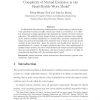Free Online Productivity Tools
i2Speak
i2Symbol
i2OCR
iTex2Img
iWeb2Print
iWeb2Shot
i2Type
iPdf2Split
iPdf2Merge
i2Bopomofo
i2Arabic
i2Style
i2Image
i2PDF
iLatex2Rtf
Sci2ools
122
click to vote
JPDC
2006
2006
A tight bound on remote reference time complexity of mutual exclusion in the read-modify-write model
In distributed shared memory multiprocessors, remote memory references generate processor-to-memory traffic, which may result in a bottleneck. It is therefore important to design algorithms that minimize the number of remote memory references. We establish a lower bound of three on remote reference time complexity for mutual exclusion algorithms in a model where processes communicate by means of a general read-modify-write primitive that accesses at most one shared variable in one instruction. Since the general read-modify-write primitive is a generalization of a variety of atomic primitives that have been implemented in multiprocessor systems, our lower bound holds for all mutual exclusion algorithms that use such primitives. Furthermore, this lower bound is shown to be tight by presenting an algorithm with the matching upper bound.
Related Content
| Added | 13 Dec 2010 |
| Updated | 13 Dec 2010 |
| Type | Journal |
| Year | 2006 |
| Where | JPDC |
| Authors | Sheng-Hsiung Chen, Ting-Lu Huang |
Comments (0)

